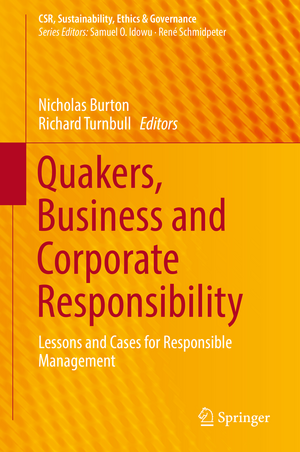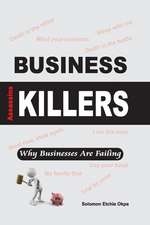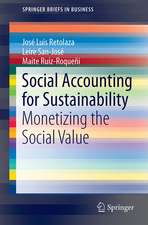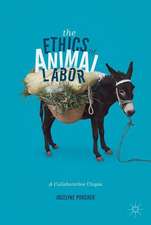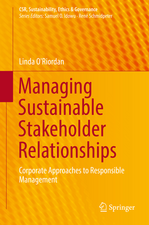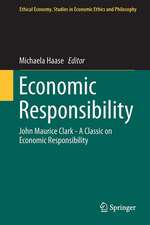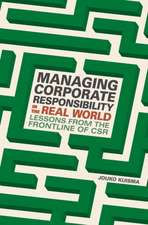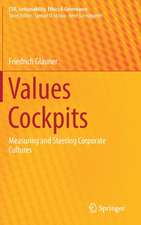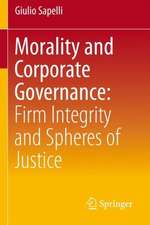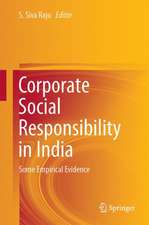Quakers, Business and Corporate Responsibility: Lessons and Cases for Responsible Management: CSR, Sustainability, Ethics & Governance
Editat de Nicholas Burton, Richard Turnbullen Limba Engleză Hardback – 17 ian 2019
Din seria CSR, Sustainability, Ethics & Governance
-
 Preț: 400.75 lei
Preț: 400.75 lei - 20%
 Preț: 879.90 lei
Preț: 879.90 lei - 18%
 Preț: 897.65 lei
Preț: 897.65 lei - 18%
 Preț: 1002.13 lei
Preț: 1002.13 lei - 18%
 Preț: 1013.02 lei
Preț: 1013.02 lei - 15%
 Preț: 645.28 lei
Preț: 645.28 lei - 20%
 Preț: 690.13 lei
Preț: 690.13 lei - 15%
 Preț: 646.62 lei
Preț: 646.62 lei - 15%
 Preț: 505.30 lei
Preț: 505.30 lei - 15%
 Preț: 647.40 lei
Preț: 647.40 lei - 24%
 Preț: 700.89 lei
Preț: 700.89 lei -
 Preț: 366.69 lei
Preț: 366.69 lei -
 Preț: 412.06 lei
Preț: 412.06 lei - 19%
 Preț: 549.70 lei
Preț: 549.70 lei - 20%
 Preț: 567.88 lei
Preț: 567.88 lei - 20%
 Preț: 575.51 lei
Preț: 575.51 lei - 24%
 Preț: 750.47 lei
Preț: 750.47 lei - 24%
 Preț: 823.02 lei
Preț: 823.02 lei - 18%
 Preț: 1003.70 lei
Preț: 1003.70 lei - 24%
 Preț: 692.29 lei
Preț: 692.29 lei - 20%
 Preț: 567.88 lei
Preț: 567.88 lei -
 Preț: 377.77 lei
Preț: 377.77 lei - 19%
 Preț: 472.32 lei
Preț: 472.32 lei -
 Preț: 367.40 lei
Preț: 367.40 lei - 20%
 Preț: 576.30 lei
Preț: 576.30 lei - 20%
 Preț: 587.30 lei
Preț: 587.30 lei - 20%
 Preț: 565.09 lei
Preț: 565.09 lei - 20%
 Preț: 565.89 lei
Preț: 565.89 lei - 20%
 Preț: 568.20 lei
Preț: 568.20 lei - 24%
 Preț: 822.49 lei
Preț: 822.49 lei - 20%
 Preț: 558.87 lei
Preț: 558.87 lei - 24%
 Preț: 1160.87 lei
Preț: 1160.87 lei - 24%
 Preț: 792.87 lei
Preț: 792.87 lei - 20%
 Preț: 573.77 lei
Preț: 573.77 lei - 24%
 Preț: 583.99 lei
Preț: 583.99 lei -
 Preț: 375.76 lei
Preț: 375.76 lei - 24%
 Preț: 688.04 lei
Preț: 688.04 lei -
 Preț: 388.13 lei
Preț: 388.13 lei - 24%
 Preț: 744.58 lei
Preț: 744.58 lei - 20%
 Preț: 593.48 lei
Preț: 593.48 lei - 20%
 Preț: 573.77 lei
Preț: 573.77 lei - 19%
 Preț: 437.63 lei
Preț: 437.63 lei -
 Preț: 365.93 lei
Preț: 365.93 lei -
 Preț: 353.51 lei
Preț: 353.51 lei -
 Preț: 366.69 lei
Preț: 366.69 lei
Preț: 562.55 lei
Preț vechi: 703.19 lei
-20% Nou
Puncte Express: 844
Preț estimativ în valută:
107.68€ • 117.00$ • 90.51£
107.68€ • 117.00$ • 90.51£
Carte tipărită la comandă
Livrare economică 16-22 aprilie
Preluare comenzi: 021 569.72.76
Specificații
ISBN-13: 9783030040338
ISBN-10: 303004033X
Pagini: 290
Ilustrații: VI, 185 p. 6 illus.
Dimensiuni: 155 x 235 x 17 mm
Greutate: 0.45 kg
Ediția:1st ed. 2019
Editura: Springer International Publishing
Colecția Springer
Seria CSR, Sustainability, Ethics & Governance
Locul publicării:Cham, Switzerland
ISBN-10: 303004033X
Pagini: 290
Ilustrații: VI, 185 p. 6 illus.
Dimensiuni: 155 x 235 x 17 mm
Greutate: 0.45 kg
Ediția:1st ed. 2019
Editura: Springer International Publishing
Colecția Springer
Seria CSR, Sustainability, Ethics & Governance
Locul publicării:Cham, Switzerland
Cuprins
Part 1: The spirit of Quaker responsible business.- Chapter 1: Transforming contemporary Businesses:the Impact of Quaker principles and insights on business in a volatile world.- Chapter 2: Towards a set of Quaker business values.- Chapter 3: Cadbury’s ethics and the spirit of Corporate Social Responsibility.- Part 2: An uneasy relationship with the State.- Chapter 4: Quaker Employer Conference of 1918.- Chapter 5: Honey I shrunk the state.- Chapter 6: Quakers, free trade and social responsibility.- Chapter 7: The Quakers and the joint stock company: uneasy bedfellows.- Part 3: Complicated Quakers.- Chapter 8: Thomas Jefferson’s complicated Friends.- Chapter 9: John Bellers (1654-1725)—A veritable phenomenon in the history of political economy’.
Notă biografică
Dr Nicholas Burton is a senior lecturer in Strategic Management & Corporate Responsibility at Newcastle Business School, Northumbria University, UK. Nicholas holds a PhD from Northumbria University and an MBA from Southampton University. Nicholas, a Quaker, publishes in the area of spirituality in management & law, convenes the research group at Quakers & Business, a recognised group of Quakers in Britain, and is an Associate Editor for the Academy of Management, management, spirituality and religion group.
Richard is a director of the renowned Centre for Enterprise, Markets and Ethics, based in Oxford, UK. Richard has a wide range of experience in business, the church and public life. He holds a degree in Theology and PhD in Theology from the University of Durham. Richard has authored several books including an acclaimed biography of the social reformer, Lord Shaftesbury, is a member of the Faculty of Theology of the University of Oxford and is a Fellow of the Royal Historical Society.
Richard is a director of the renowned Centre for Enterprise, Markets and Ethics, based in Oxford, UK. Richard has a wide range of experience in business, the church and public life. He holds a degree in Theology and PhD in Theology from the University of Durham. Richard has authored several books including an acclaimed biography of the social reformer, Lord Shaftesbury, is a member of the Faculty of Theology of the University of Oxford and is a Fellow of the Royal Historical Society.
Textul de pe ultima copertă
This book explores how the distinctive "Quaker" approach to responsible business is based on honesty, truth and integrity. It analyzes how networks, family and succession are at its heart, and how much this approach offers to current debates on corporate social responsibility, as well as to managers and practitioners in an increasingly complex business world. The contributions in this volume assess the factors that explain the success and prosperity of many Quaker businesses throughout the eighteenth and nineteenth centuries, discussing the lessons learned from their disappearance from prominence. By drawing upon examples that illustrate the Quaker ethic, it also considers what so-called “Quakernomics” can contribute to contemporary responsible business theory and practice.
Caracteristici
Offers a historical perspective on Quaker businesses for contemporary responsible business debates Provides a unique account of how spiritual concerns influence leadership and management Includes cases and best practices from the banking and finance, transport and consumer-goods industries
